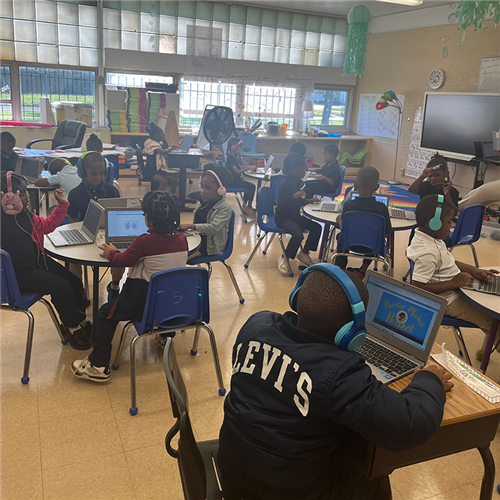Eagle's Nest Academy
Dedicated to Excellence in Education
- Eagle's Nest Academy
- Soar to new heights at Eagle’s Nest Academy
-
Overview:
Eagle's Nest Academy strongly values academic excellence and is committed to fostering a learning environment that centers the rich history of African and Afro-American cultural norms, traditions, and morals while ensuring the academic and personal success of every scholar. Our educational model integrates a unique blend of Afrocentric principles, culturally relevant pedagogy, and data-driven practices designed to elevate scholars to their highest potential. We embrace the philosophy of Ubuntu, the laws of MAAT, and the seven principles of the Nguzo Saba, which serve as guiding tenets for our scholars’ academic and personal growth. These principles are integrated throughout our curriculum, empowering students to not only excel academically but also develop a strong sense of cultural identity and community responsibility.
Program Highlights:
-
Our core educational model embraces the philosophy of Ubuntu, the laws of MAAT, and the seven principles of the Nguzo Saba.
-
Our data-driven instructional approach focuses on culturally relevant, student-centered teaching methods that actively engage scholars in the learning process.
-
Our scholars actively participate in visual and performing arts, social and emotional learning activities, physical education, and additional educational opportunities provided by the Flint Public Library.
-
1:1 school technology.
-
Free nutritious meals.
-
Free transportation.
-
Free job training for caregivers offered through Skills US, supporting the entire family’s growth and success.
The Core Foundations of our Educational Program
Our educational program is built upon three foundational pillars:
-
Active Learning. We engage our scholars through hands-on, interactive learning experiences. Our classrooms are designed to encourage exploration, inquiry, and critical thinking.
-
Culturally Responsive Pedagogy. Our curriculum and instructional practices are designed to reflect the cultural experiences of our scholars, fostering a sense of pride and positive self-identity.
-
Student-centered staff: Our highly skilled educators are trained to understand the unique needs of African American scholars and to tailor instruction to support their growth in all academic areas, from STEM to the humanities.
Culturally Responsive, Student-Centered Educational Program:
Our academic program is rooted in culturally responsive teaching practices that celebrate and honor the rich legacies of African and Afro-American contributions to the world. This commitment to cultural responsiveness guides our choice of curricular resources, ensuring they are equitable, inclusive, and designed to actively engage and inspire all of our scholars.
Core Curriculum:
-
Into Reading, our ELA curriculum is designed to engage students in literacy activities that use culturally responsive texts and content that reflect their lived experiences. Through evidence-based strategies, we guide students in becoming fluent, confident readers.
-
Eureka Math, our math curriculum, help us to build our scholars’ mathematical foundations. The focus is on critical thinking, problem-solving, and connecting mathematical concepts to real-world scenarios.
-
mCLASS, DIBELS, and Zearn, our data-driven intervention program allows us to closely monitor our scholars’ academic progress and provide them personalized interventions to support every scholar’s growth. Regular assessments ensure that we track progress and adjust instruction to meet individual learning needs.
-
Specials and Extracurricular Activities: Our offerings, including visual and performing arts, physical education, African drumming and dance, basketball, soccer, and football, provide scholars with a comprehensive and well-rounded educational experience.
-
Special Education Programs and Services. We are committed to providing an inclusive and supportive learning environment for all scholars. Our special education program is designed to meet the diverse needs of students with disabilities by offering tailored instruction, evidence-based interventions, and a team-based approach that includes collaboration with caregivers, teachers, and ancillary staff.
African-centered Education
Our commitment to African-centered education goes beyond simply teaching about African and American histories. It’s about integrating culturally responsive practices into every aspect of our scholars’ educational experience. Best practices for African-centered education at Eagle's Nest Academy include:
-
Recognizing that students of African descent perform best when their culture is represented in the curriculum. Teachers integrate African American history, literature, and the arts into daily lessons, ensuring students see themselves reflected in what they learn.
-
Encouraging collaboration between caregivers, scholars, and community. Our free job training for caregivers through Skills US and PLA University demonstrates our holistic approach to ensuring the entire family is empowered to thrive.
-
Through our emphasis on the Ubuntu philosophy, the law of MAAT, and the Nguzo Saba principles, we instill a sense of pride in scholars about their African heritage. This not only enriches their academic journey but also nurtures their character development, building leadership, confidence, and a sense of responsibility.
-
Positive interventions and supports including restorative practice circles undergird our behavioral intervention program and promote self-awareness, empathy, resilience, and interpersonal skills among scholars. This focus on emotional intelligence allows our scholars to navigate the world with confidence and compassion.
Eagle’s Nest Academy’s academic model is more than just a method of instruction. It is a transformative experience that blends the best of culturally responsive education, personalized academic growth, and the empowering principles of Afrocentric pedagogy. We are dedicated to ensuring that our scholars not only succeed academically but also become leaders in their communities and the world at large. Our mission is clear: to unlock the full potential of every student and empower them to lead lives of purpose, pride, and success.
-
Eagle's Nest Academy Administration
-

Dr. Tara M. Reid
Superintendent/Principal
treid@eaglesnestflint.org

Ms. Brittany Coder
Dean of Academics and Culture/Principal in Residence of Eagle's Nest Academy
bcoder@eaglesnestflint.org


